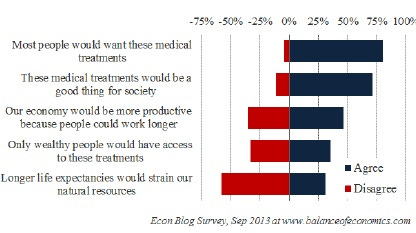Life Extension: Economists vs. the Public
Earlier this year, Pew surveyed Americans’ beliefs about life extension. I was appalled by their nihilistic responses. Worst of the bunch:
Asked about the consequences for society if new medical treatments could “slow the aging process and allow the average person to live decades longer, to at least 120 years old,” about half of U.S. adults (51%) say the treatments would be a bad thing for society, while 41% say they would be a good thing.
Americans’ awful answers made me wonder: Are economists any better? Tim Kane’s latest survey of leading econ bloggers has some answers. Prompt:
Currently, the average life expectancy in the U.S. is about 80 years old. Some people think new medical treatments will slow the aging process and will, for the first time, allow the average person to live decades longer, to at least 120 years old. Please check each item if you agree or disagree with the following statements about these potential life-extending medical treatments:
Results:
As you can see, a supermajority of economists accepts the truism that longer, healthier lives are “a good thing for society.” True, 10% of economists appear to be fans of death and misery. But by and large, ours is a life-affirming profession.
What about the other questions?
There’s a moderate gap on “Most people would want these treatments” – 68/27 for the public, versus about 77/3 for economists.
There’s a similar gap on the “Economy would be more productive” question. The public breakdown is 44/53, versus roughly 48/33 for economists.
There’s a substantial gap for “Only wealthy people would have access.” Public breakdown: 66/33. Economists’ breakdown: roughly 34/35.
There’s a huge gap on the natural resources issue. Public: 66/33. Economists: Roughly 27/55.
As usual, my fellow economists aren’t perfect. How could any economically literate person deny that the “economy would be more productive”? The hypothetical specifically states that we don’t just keep people alive longer; we actually “slow the aging process.” Under what scenarios does the implied fall in the dependency ratio fail to raise living standards? I can think of a few, but none are plausible.
As usual, economists have much to learn. Yet compared to the U.S. public, economists once again prove themselves to be an island of common sense in a sea of misanthropic folly. I don’t expect many of us will live to 120. But if will obviously be a glorious thing if we do.
If I’m still alive in 2091, party at my house. Hope to see each and every one of you there, fit as fiddles!
The post appeared first on Econlib.




I am a primary care physician in West Virginia. I am not at all surprised by this finding. When I read the question, I did not immediately interpret it to mean that life would be extended by a given number of years of positive-health-status existence. I think that much of the poor health status that many people see among the population are often thought to be the result of lack of willpower or agency, such as overweight, lack of exercise, poor eating habits, tobacco/drugs/alcohol, etc. Adding extra years without a clearer explanation of where they would be distributed makes me think of dystopian outcomes first. I guess that's just the zeitgeist now. They assume, like I do, that adding years will more often than not just add years of less-than-optimal existence, not something positive. More years in retirement to run out of savings, more years of poor mental status/dementia, etc.
In polls like this I wouldn’t take the wording too literally. Not only can the wording itself be too vague, but most people simply ask what “vibe” the question is getting at.
The vibe most people assume is “do you want to be an old person longer”. Most old people I know aren’t fans of being old people. They don’t look at more years in the nursing home fondly. That’s probably how they interpret the poll. That it’s asking about doctors doing more to keep grandma clinging to life a bit longer.